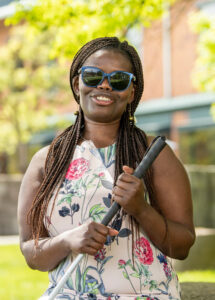Abby Griffith leaves her house at 5 a.m. and walks for 12 minutes, tapping her way down cracked sidewalks to the nearest bus station. Then she navigates two transfers, taking three buses to reach the WSU Vancouver campus for morning classes.
What would be a 15-minute drive takes her more than two hours.
“I’m totally blind, and I rely on public transportation,” said Griffith, who graduated from WSU this month with a degree in human development. “Without it, I wouldn’t be able to go very far from my house or go to college. Public transportation is vital.”
To emphasize that level of importance, Griffith recently testified before the Washington Senate and House Transportation committees. She talked about the benefits of improving public transportation and infrastructure, like sidewalks, to her and anybody with a disability.
“Cracked sidewalks are dangerous for me and people in wheelchairs,” Griffith said. “I’m happy that I can talk about my experience and advocate for people who can be helped by improvements in these areas.”
The testimony was online for both committees, presenting an opportunity and a challenge for a person without sight. She could easily attend without having to travel to Olympia, but she couldn’t see the timer that counted down her limited window.
“I was nervous because this is an important topic, but I was upset at the same time,” Griffith said. “Public transportation and infrastructure need major improvements to allow people with disabilities to live their lives.
She also wrote an op-ed piece, talking about her experiences using public transportation.
A background dealing with change

A native of Ethiopia, Griffith came to Washington when she was adopted at age 14 in 2008. She lost her sight when she was eight.
“Being blind is a big part of my self-identity,” Griffith said. “I lost my sight when I was playing outside by a river and a cobra spit poison in my eyes. They became infected and I gradually lost sight in both eyes.”
Adapting to total blindness after being sighted was a difficult transition, but she made it work. She uses advanced technologies, like screen readers, braille displays for her phone, and other modern marvels that make it possible to attend WSU and live independently.
Improving lives through advocacy
Griffith got involved in advocating through the nonprofit group Disability Rights Washington, where she was interviewed as part of a story map project.
“Abby was great to talk to about her experiences growing up in an area without transit service,” said Anna Zivarts, director of the Disability Mobility Initiative at Disability Rights Washington. “We reached out to her to see if she was interested in doing more advocacy work.”
That led to the op-ed, as well as Griffith’s testimony to the legislature. She was also a panelist at a disability rights online conference, and attended an event in Vancouver to highlight areas with missing and damaged sidewalks.
“She’s been so enthusiastic and always reaches out wanting to do more,” Zivarts said. “It’s great working with her and seeing her learn about other career and life opportunities that are available to her.”
The advocacy group is working to create an internship opportunity for Griffith this summer.
Advocacy work has impacted Griffith’s education and career goals. She earned an associate’s degree from Clark College before enrolling at WSU Vancouver in 2018. Next, she plans to earn a master’s degree in education, and ultimately teach blind and visually impaired students.
“I want to support K-12 blind and visually impaired students that are in their public schools,” Griffith said. “Teach them braille, show them how to use technology, work with teachers on how to best teach blind and other students with disabilities. I want to be there to improve the lives of the next generation.”
‘She sees no reason she shouldn’t do something’
The past year-plus of online-only courses has been a struggle for all students, and Griffith in particular.
“Zoom and blackboard are very useful, but they aren’t completely accessible,” she said.
The second half of the spring 2020 semester was very difficult because she had to work out how to use those programs without being able to easily talk with her professors. She learned last fall that she had to reach out to her instructors and was able to set up regular individual meetings with all of them.

“I take my education very seriously,” Griffith said. “And my professors made my life so much easier by figuring out how to help me work around the problem areas.”
In normal times, human development majors complete an internship to graduate. Since many organizations aren’t working in-person or doing internships, the department created a special Global Campus course on facilitating change to meet the requirement. Griffith worked with the course’s instructor, Joe Hewa, to connect with Disability Rights Washington.
“It was part of her service learning project,” said Hewa, director of WSU’s Center for Transformational Learning and Leadership. “She took an active role in her community change project and sought ways to make a real difference.”
Griffith is interested in areas beyond blind awareness, including the experience of black women.
“She deeply wants to improve her own life, but also the lives of others like her,” said Hewa, who meets with Griffith online once a week. “She sees no reason she shouldn’t do something like testify before the legislature. She’s incredibly bright, dedicated, and driven. I can’t wait to see what she does next.”
Her plan now is to enroll at Portland State University in the Fall of 2022 to work on a master’s degree in education. Her immediate plans are to start in June as an intern with Disability Rights Washington.
“I’m so excited, both about grad school and doing advocacy work,” Griffith said. “I’m ready to go after I graduate from WSU.”





